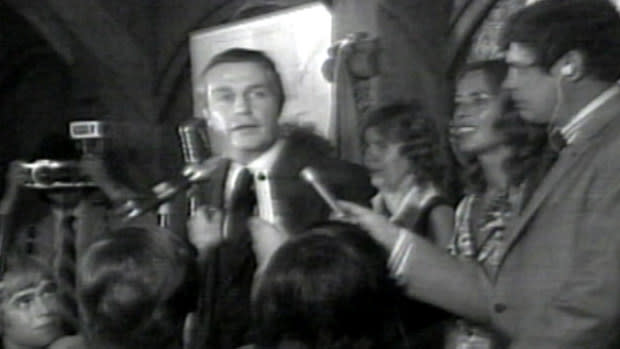Alberta marks 40 years of Tory governments

After six years as party leader, Peter Lougheed led Alberta's Progressive Conservative Party to victory on Aug. 30, 1971 by defeating Harry Strom's Social Credit Party.
The Tories exceeded all expectations by capturing 49 of 75 seats and ending 36 years of Social Credit governments in Alberta.
While one Alberta political dynasty ended that night, another had begun. The Progressive Conservative party has won majorities in every election since.
"I didn't think we were going to win," Lougheed said in an interview with CBC News. "I thought it would take at least another election.
"We'd only started in 1967 with our six members and became 10 and to form the government, I just didn't think we could do that."
The Conservatives won four more consecutive elections with Lougheed at the helm. As premier, Lougheed set up the Heritage Fund and battled Ottawa over natural resource ownership, strategies he felt were key to winning voter support.
"People forget when we had those huge majorities, many of those people weren't Progressive Conservatives," Lougheed said. "They were voting for us because of what we were doing."
Former Edmonton Eskimo player and cabinet minister Don Getty became premier after Lougheed stepped down as party leader in 1985. Getty's seven years as premier were difficult as the province struggled with sinking energy prices and rising deficits.
By 1992, the province's debt had ballooned to $22 billion and the province's Liberal party was polling ahead of the Tories.
When Getty opted to retire in 1992, Ralph Klein, the former populist Calgary mayor, won the leadership on a second ballot.
Deficit reduction was the priority during early part of the Klein years. Wage rollbacks and public service layoffs led to protests but Klein's popularity continued to climb. Alberta was back to balanced budgets within a few years.
In 2001, Klein won his largest majority — 74 of 83 seats. Three years later, clad in a white cowboy hat and blue denim, Klein brandished a sign stating "Paid in Full" while proclaiming the province would pay off its debt by the end of the fiscal year.
But by 2006, party members had grown unhappy with Klein's leadership and pushed him to step down as leader and premier later that year after receiving a tepid 55 per cent support in a leadership review.
Current premier Ed Stelmach surprised almost everyone by winning the leadership contest on the second ballot. Stelmach reworked the royalty regime in the energy sector and spent billions on infrastructure.
Despite rumblings from within the party about his leadership, the Tories under Stelmach won a landslide victory in the 2008 election, winning 72 of 83 seats.
However a worldwide recession soon saw oil prices falling again, turning provincial surpluses into multi-billion dollar deficits. Stelmach resisted making cuts, preferring instead to put money into infrastructure.
Some caucus members crossed the floor to join the upstart Wildrose Party. A conflict over spending cuts during this year's budget talks led to discord among other caucus members.
In January, Stelmach shocked everyone by announcing he would not seek re-election. He later announced he was stepping down on Oct. 1, 2011.
Now six hopefuls are running to replace him as premier and party leader: Ted Morton, Doug Horner, Doug Griffiths, Alison Redford, Gary Mar and Rick Orman.

